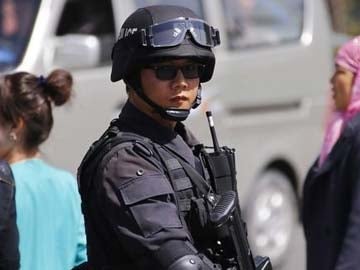
Police from Special Weapons and Tactics (SWAT) team stand guard outside the South Railway Station.(Reuters)
Beijing:
China will set up a national anti-terrorism intelligence system, state media said on Monday, reporting changes to an anti-terror law expected to be passed this week in the wake of an upsurge in violence in the far western region of Xinjiang.
Amendments to the counter-terrorism law aimed to improve intelligence gathering and the sharing of information across government departments, while also enhancing international cooperation, the official Xinhua news agency said.
Other changes will focus on the "management" of the Internet, the transport of dangerous materials and border controls, Xinhua added, without providing details.
Hundreds have died in the past two years or so in Xinjiang in unrest blamed by Beijing on Islamists who want to establish a separate state called East Turkestan.
Rights groups and exiles though blame Beijing's repressive policies for stoking resentment among the Muslim Uighur people who call Xinjiang home.
"Our country is facing a serious and complex struggle against terrorism," Xinhua said.
Some recent attacks in Xinjiang have pointed to serious intelligence failures despite the massive security presence there, including a bomb and knife attack at a train station in April that happened as President Xi Jinping was wrapping up a visit to the area.
China has traditionally had a problem gaining cooperation with Western countries in its fight against terror because of concerns about human rights.
The government also plans to amend the National Security Law, replacing it with a counter-espionage law, Xinhua said in a separate report, giving only vague details about what the new law will include.
China has notoriously broad laws concerning state secrets, covering everything from industry data to the exact birth dates of state leaders. Information can also be labelled a state secret retroactively.
In severe cases, the theft of state secrets is punishable with life in prison or the death penalty.
In August, the government said it was investigating a Canadian couple who ran a coffee shop on the Chinese border with North Korea for suspected theft of military and intelligence information and for threatening national security.
Amendments to the counter-terrorism law aimed to improve intelligence gathering and the sharing of information across government departments, while also enhancing international cooperation, the official Xinhua news agency said.
Other changes will focus on the "management" of the Internet, the transport of dangerous materials and border controls, Xinhua added, without providing details.
Hundreds have died in the past two years or so in Xinjiang in unrest blamed by Beijing on Islamists who want to establish a separate state called East Turkestan.
Rights groups and exiles though blame Beijing's repressive policies for stoking resentment among the Muslim Uighur people who call Xinjiang home.
"Our country is facing a serious and complex struggle against terrorism," Xinhua said.
Some recent attacks in Xinjiang have pointed to serious intelligence failures despite the massive security presence there, including a bomb and knife attack at a train station in April that happened as President Xi Jinping was wrapping up a visit to the area.
China has traditionally had a problem gaining cooperation with Western countries in its fight against terror because of concerns about human rights.
The government also plans to amend the National Security Law, replacing it with a counter-espionage law, Xinhua said in a separate report, giving only vague details about what the new law will include.
China has notoriously broad laws concerning state secrets, covering everything from industry data to the exact birth dates of state leaders. Information can also be labelled a state secret retroactively.
In severe cases, the theft of state secrets is punishable with life in prison or the death penalty.
In August, the government said it was investigating a Canadian couple who ran a coffee shop on the Chinese border with North Korea for suspected theft of military and intelligence information and for threatening national security.
© Thomson Reuters 2014
Track Latest News Live on NDTV.com and get news updates from India and around the world

